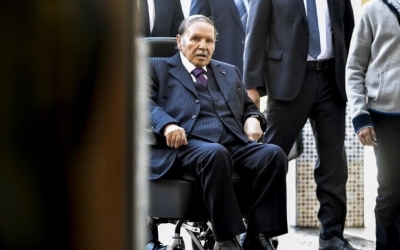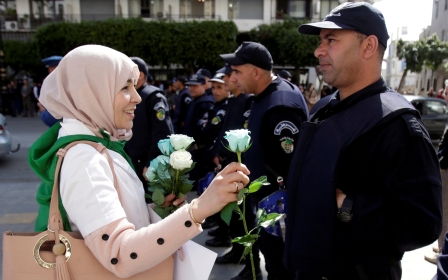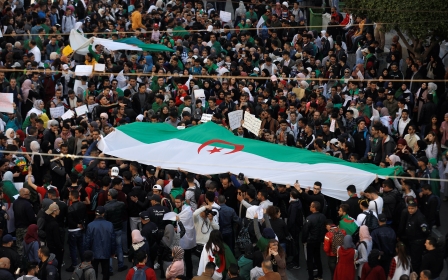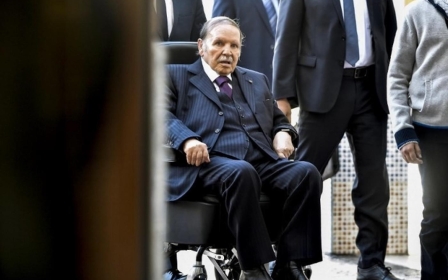New Algerian prime minister promises 'technocratic' government

Algeria's new prime minister has promised to form a "technocratic" government following his predecessor's resignation in the wake of mass protests in the country.
Noureddine Bedoui said at a press conference on Thursday that his government would be inclusive and feature young Algerians, who have been at the forefront of months-long demonstrations against President Abdelaziz Bouteflika's bid for a fifth term as president.
The prime minister urged the opposition to accept dialogue. But lawyers and activists who protesters have chosen to lead the drive for reforms are in no mood to compromise and say they will not negotiate, at least for now.
Abdelaziz Bouteflika, Algeria's ailing president
+ Show - HideIt’s not uncommon to hear Algerians say “He’ll bury us all” when referring to their 82-year-old president, Abdelaziz Bouteflika.
His 20-year rule makes him the country’s longest serving head of state, but his political career stretches back to the 1960s, to a time when the ailing octogenarian cut a far more dashing figure.
In 1962, the same year that Algeria won its independence after a revolutionary war with France, Bouteflika was appointed a government minister. He was just 25.
Widely viewed as a political prodigy, he was promoted to foreign minister the year after, and was tasked with steering the resource-rich country through the minefield of Cold War rivalries.
After a period in exile from the late ‘70s through to the ‘90s, Bouteflika would eventually return to Algeria and win a presidential election in 1999, before presiding over the ending of a civil war that had torn the country apart for over a decade.
The early years of his rule were marked by an unprecedented growth in Algeria’s public purse amid skyrocketing oil prices. He was also been able to wrest control of political decision-making from the military and intelligence services by ending a 19-year state of emergency in 2011.
Yet his tenure has also been characterised by protests and riots over the unfair distribution of oil income, poverty and unemployment.
Bouteflika is credited with checking military influence. However ordinary Algerians widely view figures in the military as key players in le pouvoir (the power), a group of unelected - and often invisible - individuals said to wield almost limitless power over their lives.
The president has rarely been seen in public since he suffered a stroke in 2013.
His announcement that he would run for a fifth term brought simmering discontent out into the open, as people poured onto the streets.
As figures from the intelligence services and judiciary came out in support of the protests, Bouteflika declared on 11 March that he would not stand for re-election.
He added that his government would be in charge for a "short period of time" and would support the work of a national conference for a political transition.
An independent commission will oversee Algeria's presidential election, he also told a news conference in Algiers.
Stay informed with MEE's newsletters
Sign up to get the latest alerts, insights and analysis, starting with Turkey Unpacked
Bedoui was appointed premier this week after Ahmed Ouyahia resigned.
The ailing Bouteflika has promised not to run for a fifth term as president of the north African country, but also announced the postponement of April elections and said a referendum would be held on a new constitution.
Former prime minister-turned-opposition activist Ali Benflis criticised the extension of Bouteflika's term on Facebook on Monday.
"The extension of the fourth term is an act of aggression against the constitution by non-constitutional forces (hinting at the shadow advisers surrounding the president, first and foremost his brother Said)," he wrote.
Walid Laggoune, a professor of constitutional law at the University of Algiers, told public radio: "The constitution does not provide for any provision on the postponement of elections."
However, he added that in certain political situations "it is the duty of those who have the decision to consider this postponement to meet the social demands".
"On paper, two ways are possible," a source close to Bouteflika's campaign team told Middle East Eye.
"Either a change in the constitution, which will take time, or the use of Article 107, which allows the president to take exceptional measures in case of 'imminent danger to its institutions, to its independence or to its territorial integrity'."
Middle East Eye delivers independent and unrivalled coverage and analysis of the Middle East, North Africa and beyond. To learn more about republishing this content and the associated fees, please fill out this form. More about MEE can be found here.





